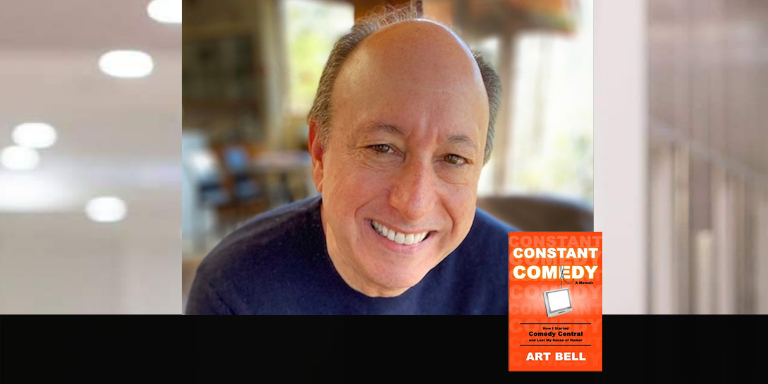Art Bell is a writer and former media executive known for creating, building, and managing successful cable television channels. His memoir, Constant Comedy: How I Started Comedy Central and Lost My Sense of Humor (September 2020, Ulysses Press) tells the story of how, while a financial analyst at HBO, he pitched the idea of a 24-hour comedy network that he then helped develop and launch. Constant Comedy was recently honored as a finalist in the 2020 Best Book Awards for memoir.
Art went on to hold senior executive positions in both programming and marketing at Comedy Central. During that time he also coauthored a humor book entitled Web Sightings: A Collection of Websites We’d Like to See. After leaving Comedy Central, Art became President of Court TV, where he was a guiding force behind one of the most successful brand evolutions in cable television. In addition to writing, he plays piano and jazz drums. Art Bell currently resides in Greenwich, Connecticut, and Deer Valley, Utah, with his wife.
Tell us a little bit about your background and how you ended up writing a book?
I grew up on the Jersey shore, a child of the 60’s. My first love was comedy and from the age of six I watched comedians on tv, listened to comedy albums, read Mad magazine and National Lampoon, and tried to be funny. In college and grad school, I performed in sketch comedy and plays, some of which I wrote. My first job after college was as an economist in Washington DC. I went to graduate business school and decided to work in the television business in the hope that I could somehow work in or near the comedy business. I had no desire to be a comedy writer or stand-up comic. Despite the proliferation of cable channels at that time, there wasn’t an all-comedy channel, so I got a job as a financial analyst at HBO, but took a chance on pitching my comedy channel idea. It was initially turned down, but I persisted and convinced the Chairman of HBO to launch The Comedy Channel, which became Comedy Central. Creating and launching the channel was the greatest adventure of my career. Thirty years later I wanted to tell the story so I wrote a memoir about my experience.
What do you hope your readers take away from this book?
My memoir is a story of persistence and problem-solving in order to turn an idea into a reality. People may be under the impression that Comedy Central was successful from the start. It wasn’t—it was initially considered a failure and savaged by the press, but I was hell-bent on seeing a comedy channel in the world and kept at it until it was successful. The memoir provides a candid behind-the-scenes look at the television industry for those interested in pursuing a tv business career, and also a realistic look at how business works in general.
What are the top three tools you are currently using to write, publish, and promote your books?
First, I pursue podcasts and radio interviews using a publicist. Second, I maintain an active social media presence and find that LinkedIn has been particularly effective since my book is about entrepreneurship, or more specifically, intrapreneurship (starting a new business inside an existing business). I’m also on Facebook and Instagram. Third, I’ve written and published articles about my business experience and I’ve spoken at business conferences about what I learned from my career.
What were the top three mistakes you made publishing your book what did you learn from it them?
I didn’t pay enough attention to online advertising, and I’m just starting to see how effective it can be. My website probably needs more attention and I’m not sure how to make that more useful to promoting my book. And I regret not holding on to my audio rights, only because my publisher is not planning on doing an audiobook for several months. I would have preferred to have it out sooner.
When will you consider your book a success?
I consider it a success already because I’ve gotten a lot of opportunities to speak to young people about their careers. I’ve also been asked to speak at business conferences and other organizations. When I wrote the book, my hope was that it would lead me to a speaking “career,” not for financial reasons, but to be helpful, interesting, insightful, and entertaining to those interested in learning more about my story.
What is the one thing you wish you knew before publishing your book?
I knew promotion would be difficult, but I didn’t know how many books are published each year. It’s tens of thousands, so the fight to get noticed is even more daunting than I imagined.
- Built to Last – by Jim Collins;
- Walking with Destiny – (recent Churchill biography) by Andrew Roberts;
- The Plot Against America– by Phillip Roth
Find a writer’s group as soon as possible. Also, study writing with a teacher who can help you become a better writer.
What is your favorite quote?
“Tragedy is when I cut my finger. Comedy is when you fall into an open sewer and die.”
– Mel Brooks
How can we get in touch with you?
I recommend a visit to my website, artbellwriter.com, where you’ll find information about me and my memoir, my blog, a self-interview, and contact information. I also have a Facebook page, Art Bell, Author, where folks can message me.
Random Interview: PR Entrepreneurs: Before Starting a PR Business, I Wish I Knew








